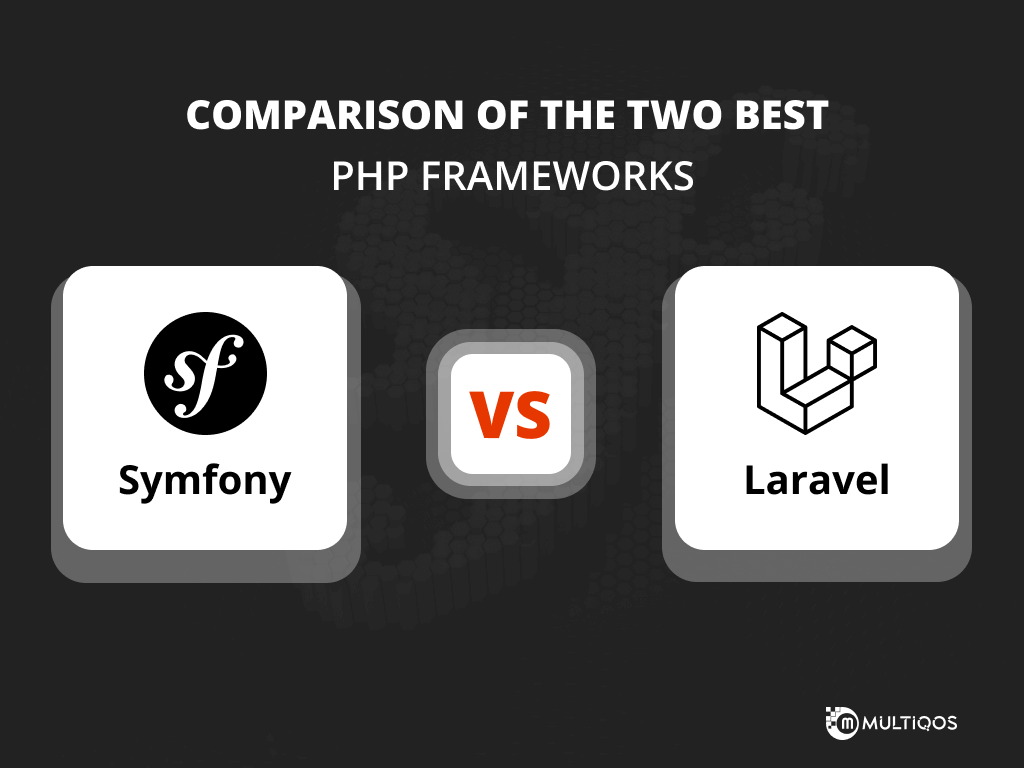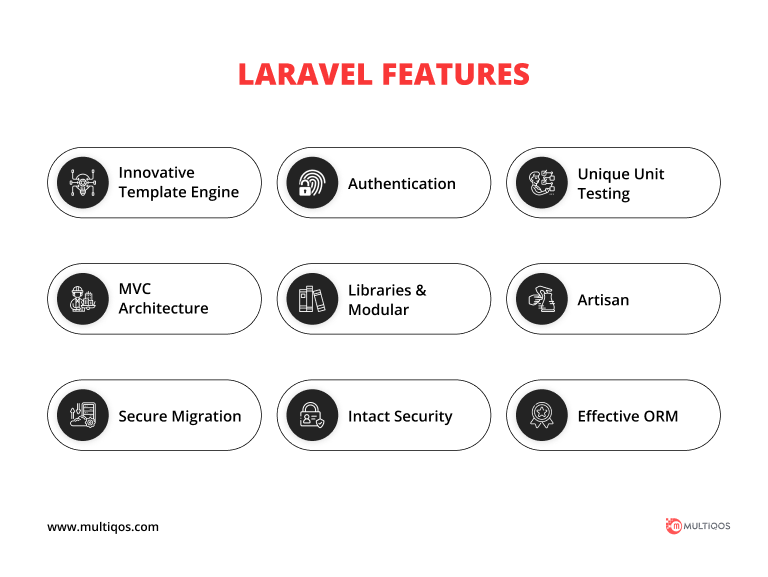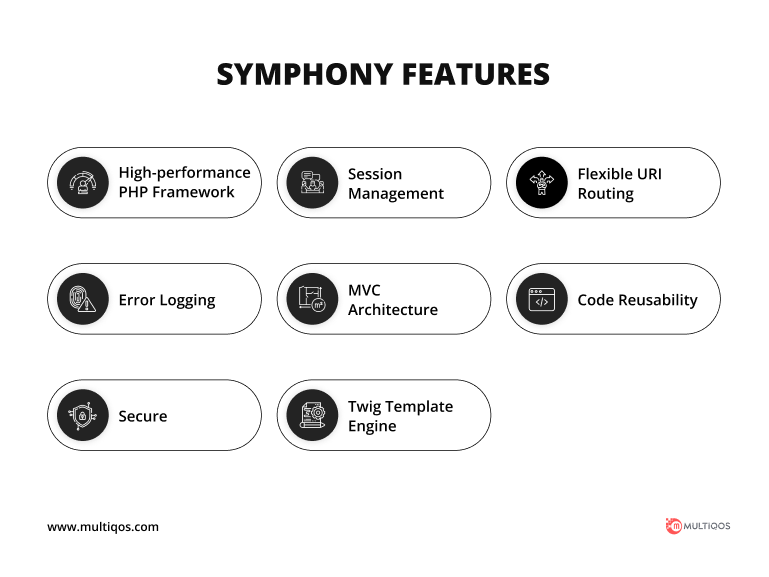Symfony vs Laravel: Comparison of the Two Best PHP Frameworks

Developing high-quality websites and applications in the shortest amount of time is one of the most difficult tasks facing today’s startups and small businesses. As a result, before initiating any Web Development Projects, business owners all over the world want to compare PHP frameworks, i.e., laravel vs Symfony 2024. Therefore, for web development of all kinds, both are excellent options. However, each of them has a number of pros and disadvantages, which we will discuss in this article.
Laravel vs Symfony: Overview
Laravel:
Laravel was built in June 2011 by Taylor Otwell as an alternative to CodeIgniter. Laravel is a well-known open-source PHP web framework distributed under the MIT licence. In addition, laravel is a qualified MVC framework (model, view, controller). As a result, database maintenance and application deployment are made easier with a wide number of ways for accessing relational databases.
All businesses can benefit from Laravel, a popular PHP framework. It has been lauded for its constant performance, rich features, and adaptability by leading PHP developers throughout the world. Using a simple and elegant syntax, Laravel claims to be a framework for quick development that’s easy to pick up on, read, and manage. It was the most extensively used framework in 2016. On GitHub, it has twice as many stars as competing frameworks, according to Google Trends and Google searches.
Symfony:
Framework for PHP development and reusable PHP components from Symfony. Symfony was created in October 2005 by Fabien Potencier under the MIT licence. Because Symfony is open-source, each programmer can tweak it to match their own specific needs by developing any necessary modules. It operates in exactly this manner. As a result of the Symfony community’s size and support, each user has an equal number of options. In addition, bespoke components can be included in the framework for those who can’t find what they’re looking for here.
The MVC (Model View Controller) model can be used to structure the PHP Web Development Symfony to its full potential. Nevertheless, it is not an MVC framework in the sense of Laravel. Coding issues are eliminated with the Symfony Framework, and time is saved during website development. Users should be allowed to develop their software according to the project’s premise. The availability of free framework components and high-end setups eases developers’ lives.
Laravel vs Symfony: Features
The difference between Laravel and symphony features are:
Laravel:
- Innovative Template Engine
- Authentication
- Unique Unit testing
- MVC Architecture
- Libraries & Modular
- Artisan
- Secure Migration
- Intact Security
- Effective ORM
Symphony:
- High-performance PHP Framework
- Session Management
- Flexible URI Routing
- Error Logging
- MVC Architecture
- Code Reusability
- Secure
- Twig Template Engine
Laravel Vs Symfony: Usage Statistics and Market Share
Laravel:
In today’s world, in the comparison between PHP Laravel vs Symphony, PHP Laravel offers numerous benefits without sacrificing app usability. Laravel is the framework of choice for the majority of developers because to its object-relational mapping (ORM), caching, routing, authentication, and eye-catching template design. As a result, more than a million websites have been built using this PHP framework so far. According to Similartech’s research, 114, 048 websites employ the PHP Laravel Framework, including shopping, arts & entertainment, and business industries.
- There is 10.12 percent of talented programmers who use Laravel, according to the Stack Over Flow developers 2021 study.
- Laravel is the subject of 187,206 queries on stack overflow.
- Laravel has a 0.32 percent market share.
- In the recent month, 785 new websites were created, and 726 of those websites ditched Laravel.
Symfony:
The number of websites built using Symfony still lags behind Laravel, which is the most popular PHP front-end framework. More than 15,000 websites utilize Symfony, according to SimilarTech. Additionally, there are several health-related websites built using Symfony. However, PHP Laravel holds the top spot in market share compared to the other frameworks, as it dominates the top 10,000, 100,000, 200,000, 300,000, and even the entire internet.
- In the StackOverFlow developers survey 2021, 86% of developers said they were using it.
- Symfony has 70,328 questions on StackOverflow.
- Symfony has a minuscule 0.04 percent market share.
- The number of websites utilizing Symfony has increased by 99 and decreased by 45 in the last month.
Laravel vs Symfony: Use Cases
Laravel Use Cases:
- Web applications hosted on a SaaS platform
- Web apps allow users to watch content on-demand
- apps for e-learning
- Web-based stock-trading applications
- Reward and recognition web applications
- CMS systems that support many languages
- Apps that check the functioning of a website on your server
Symfony Use Cases:
- Content Management System (CMS) for Single-Page Applications (CMS)
- Enterprise-Level Software
- Intranet applications and tools
- Websites for Social Networking
Laravel Vs Symfony: Popular Apps Built
Laravel:
- The e-learning website Laracasts offers a variety of courses and acts as a forum for specialists to respond to and resolve technical questions.
- Market data such as stock prices, currency exchange rates, trade offers, and gold prices were made available to Barchart, a financial portal.
- Dashboard, media administration and configurable back-end support are all included in Asgard CMS’s futuristic ready-to-use modules.
- Using incentives and recognition systems, World Walking, a non-profit healthcare platform, aims to motivate individuals to walk more often.
- As a mortgage calculator, Neighborhood Lender employs Laravel as back-end support to make complex mortgage processes easier to understand and manage
Symfony:
- Spotify created Symfony to build a highly configurable platform that could easily adapt to their target audience and was easy to maintain.
- Symfony was used as a back-end for BlaBlaCar, allowing users to access data for booking and tracking rides instantly.
- To improve the productivity of its users, Course Hero was used to optimizing their schedule, task management tools, email, and the database of courses.
- To construct an advanced search and comparison feature for hotels on its site, Trivago used it.
- Vogue created database “shelves” containing their material in French and Dutch for readers to access via websites.
Laravel vs Symfony: Similarities
There are numerous parallels between these frameworks based on the information available to the general public. The first thing is that both frameworks are free and open-source, and both employ the PHP language in the PHP Symfony vs Laravel. In addition, Symfony and Laravel share the ability to deploy the framework with extra components in the system and a cross-platform design.
Developing a PHP application can be much more efficient by using Symfony or Laravel’s cross-platform PHP frameworks and functionalities. The application’s scaffolding and plugins provide you with the flexibility to swiftly add new features. Both choices begin in an excellent spot from the outset. However, what differentiates the two is based on the developer’s application and developer demands.
Laravel vs Symfony: Key Differences
Despite the fact that these two frameworks share some similarities, both Symfony Laravel differences are present. Symfony may be referred to as a “standard” PHP language, but it contains unique and one-of-a-kind features that make it stand out. PHP’s most popular framework will be Laravel by the year 2024. It is more reliant on magical means and characteristics. As a result, the framework’s code is cleaner and easier to understand. You can hire Laravel Developers or hire Symfony Developers who can walk you through the app development process in detail, explaining the best option for your project.
Symfony Vs Laravel Comparison
- Laravel vs Symfony Popularity
Despite the fact that you shouldn’t rely your decision on a PHP framework’s popularity alone, there are several advantages to having a huge user base. Although Laravel is the most widely used PHP framework, Symfony is still ranked second on the list. Because of this, online training and support material are abundant. When it comes to learning Laravel, Laracasts’ courses are a great way to supplement what Symfony currently offers. Even while Symfony and Laravel share excellent documentation, the latter’s resources are far more comprehensive.
- Laravel vs Symfony Performance
When evaluating the performance of these frameworks, keep an eye on how quickly a site is built on top of the loads. According to Mobileappdaily, Laravel websites load in 60 milliseconds, while Symfony websites load in 250 milliseconds. Symfony sites cache views and source code, whereas Laravel sites cache just views.
- Laravel vs Symfony Middleware
Middleware is supported by both frameworks, but each implements a different pattern. For example, decorator and observer patterns are used in the Laravel and Symfony frameworks. Define a function that calls the next middleware level using the decorator technique. The Observer in Symfony allows you to add listeners to events before and after. There are advantages and disadvantages to each of these options.
- Laravel vs Symfony Speed
Maintaining and managing the application’s pace in numerous ways in PHP Symfony is very clever. A specific component or an entire application’s speed may be improved by removing unneeded features or improving the quality of the code, for example. Unfortunately, the PHP Laravel Framework does not have any speed-enhancing capabilities. For the most part, it ensures a proper version control functionality, which will help with application migration in the future.
- Laravel Vs Symfony Modularity and Scaling
For MVC-based web projects, Laravel is a good choice. However, it will be of little use if you begin your project using a methodology other than the MVC paradigm. On the other hand, the modularity of Symfony is enhanced by the inclusion of reusable components.
Symfony excels in large and complex projects due to its ability to cleanly handle vast amounts of code. Because of this, almost every business prefers Symfony to Laravel when it comes to PHP frameworks. Furthermore, Symfony’s modularity and adaptability make it easy to expand and scale even the most complicated online applications.
- Laravel Vs Symfony Template
When comparing PHP Laravel vs Symfony, the template engine is another element to keep in mind. The blade is used by Laravel, while Symfony uses a twig. Blade outgrows Twig because of its code reusability feature. Blade makes it possible for PHP Laravel developers to use the same code more than once, whereas Twig necessitates redefining functions.
- Laravel vs Symfony Cost & Time
Web developers may quickly do PHP programming with the Laravel PHP framework’s reduced code and improved performance. To sum it up, Laravel is an excellent option for a new company web application because it’s quick to deploy and requires few resources. On the other side, using Symfony at the beginning of a project costs a lot of time, work, and money. Additionally, it requires considerable time and work to put together. However, for sophisticated web application projects, this PHP framework is a fantastic option because of its functionality.Pros & Cons of Laravel and Symfony
Let’s take a look at Symfony Vs Laravel’s advantages and disadvantages
Laravel Framework’s Advantages
- Pre-made tools
- It’s always up to date with the most recent features of PHP.
- API integration with the most common apps and email services is possible.
- Other platforms and libraries are also supported.
- Routing
- Automated testing
- robust set of third-party applications available.
- Artisan CLI provides automation
Laravel Framework’s Disadvantages
- Congestion in the back-end as a result of Laravel’s brevity
- Because Laravel is optimized for mobile performance, some of its applications may be larger and take longer to load.
- The code may be broken if you update Laravel to a newer version.
- Independent libraries that can’t be trusted
- Because of the large population, it can be difficult to locate a reputable library.
Symfony Framework’s Advantages
- Quite a significant number of programmers are actively working with Symfony. As a result, it has one of the industry’s most robust user bases.
- Symfony is an excellent choice because it is used by popular platforms such as Magento, Drupal, and eZ Publish.
- Symfony is regularly updated to meet the needs of web developers.
- Symfony bundles are really simple to install and utilise.
- Due to Symfony’s inclusion of all the characteristics, a PHP framework should have can effectively serve as an all-in-one solution for developing PHP applications at the lower levels.
- Symfony offers a large community, network debugging, and plugin packages.
Symfony Framework’s Disadvantages
- As a result of its high learning curve, it is more difficult to master than other frameworks.
- Symfony’s dependencies on other technologies can slow down some projects.
- It takes a long time to produce something that can be used for many different purposes.
Laravel Vs Symfony: Which One to Choose for Your Next Project?
With Laravel, you can get your app up and running in a short period of time without spending a lot of money. Many ready-to-use implementations are included in Laravel when you download them. On the other side, some solutions may not be valuable to you, and you may never have used them. Your web developer’s labour, budget, and mental wellbeing will all be better off as a result.
Symfony is a long-term solution for big projects. It’s more expensive, but it pays off in the end when you want to tailor your software to your own needs and tastes. In other words, newer Symfony versions such as Symfony 4 make it easier to add only what you need and remove what you don’t. This framework is made up of bundles, which means that you may make significant changes at the bundle level without reworking the entire project. You may be able to get more done in less time using Symfony than other frameworks if you select the right elements.
It’s hard to go wrong with either Laravel or Symphony because of their widespread use and solid reputations. For starters, the most important step is deciding what project we’ll be working on and how many features it will include, and then you can compare Symfony vs Laravel 2024.
Final Words
In terms of robustness, dependability, and feature variety, Laravel and Symfony stand head and shoulders above the competition. There is no obvious answer as to which one should be picked. It is entirely dependent on your requirements. Laravel is the finest choice to develop a new product or take on smaller projects. PHP Laravel is a good option if you start with a startup or have a few modest projects. As a result, adding more Laravel developers to the project is easier because many programmers are familiar with the language.
On the other hand, PHP Symfony is a superior solution for long-term, complex projects since it is fast, extensible, reliable, versatile, and long-lasting. You should choose the one that is most appropriate for your project. Alternatively, be careful to select a PHP framework that you are most comfortable with when developing web applications. You can hire Symphony or a laravel development company and avail the website development services.
Looking to Hire Dedicated Laravel Developer?
Our skilled laravel developers provide tailored solutions that match your project's unique needs.
FAQ about Laravel vs Symfony
Symfony enables everyone to work efficiently and successfully. Many of its components are reusable in a broad variety of applications. Twig, Laravel’s Templating technology, is a favourite among developers. You can debug the network with Symfony’s built-in debugging tools and plugins. Symfony is popular among developers due to its ease of use.
Since Laravel relies on 3rd-party libraries from Symfony’s components, both the frameworks, i.e., Symfony and Laravel, are similar.
Symfony is more difficult to learn than Laravel.
Simple and easy installation are two reasons why Laravel is so widely used.
Between Laravel and Symfony, there is no clear winner because it all relies on your end goal.
Laravel has a lot going for it. In addition to its user-friendly syntax and extensive documentation, it is a great choice for beginners. It can be easily scaled and expanded. It’s incredibly popular, so finding a developer to assist the community is a cinch. Easy integration with the front end and quick to implement is another of its advantages. Everything is ready to go: CLI, LTS, cron jobs, etc.
Other PHP frameworks include Codeigniter, Zend Framework, Phalcon, FuelPHP, CakePHP, Yii, PHpixie, Slim, Laravel and Symfony.
Get In Touch






